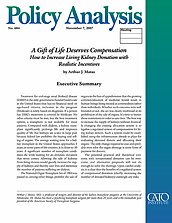Treatment for end-stage renal (kidney) disease (ESRD) is the only government-funded health care in the United States that has no financial need- or age-based criteria; inclusion in the program (Medicare) is solely based on diagnosis. If a person has ESRD, treatment is covered by Medicare. No other criteria must be met, but the best treatment option, a transplant, is not available for most patients. Compared with dialysis, a kidney transplant significantly prolongs life and improves quality of life, but kidneys are scarce in large part because federal law prohibits the buying and selling of organs. The average waiting time for a kidney transplant in the United States approaches 5 years; in some parts of the country, it is closer to 10 years. A significant number of transplant candidates die while waiting for an altruistic donation that never comes. Allowing the sale of kidneys from living donors would greatly increase the supply of kidneys and thereby save lives and minimize the number of patients suffering on dialysis.
The National Organ Transplant Act of 1984 was passed to, among other things, prohibit the sale of organs in the face of apprehension that the growing commercialization of medicine would result in human beings being treated as commodities rather than individuals. Whether such concerns were well founded or not, the act was clearly overbroad in its prohibition of the sale of organs. It’s time to loosen those restrictions in order to save lives. The best way to increase the supply of kidneys without drastically changing the existing allocation system is to legalize a regulated system of compensation for living kidney donors. Such a system could be established using the infrastructure already in place for evaluating deceased donors and allocating their organs. The only change required to ease and probably even solve the organ shortage is some form of payment for donors.
The potential practical and theoretical concerns with compensated donation can be overcome, and alternative proposals will not do enough to solve the shortage. Upon careful analysis, it is clear that the benefits of a regulated system of compensated donation (chiefly, increasing the number of donated kidneys) outweigh any risks.
About the Author

This work is licensed under a Creative Commons Attribution-NonCommercial-ShareAlike 4.0 International License.
